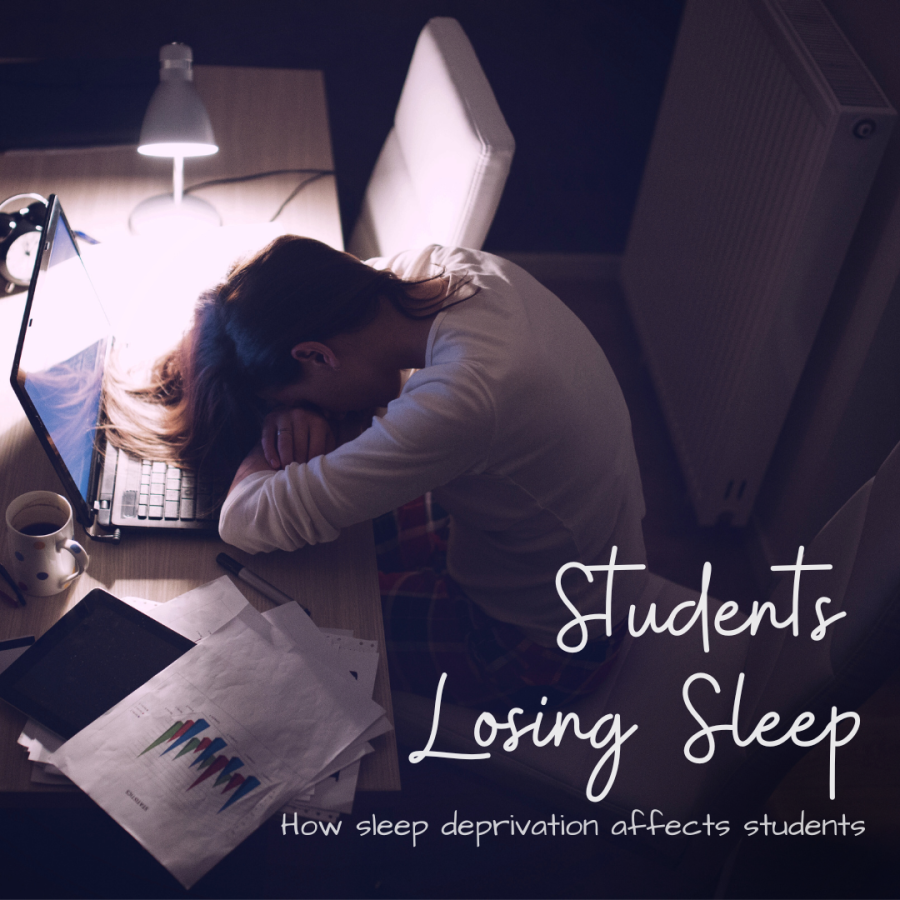Students Losing Sleep
How sleep deprivation affects teenagers
May 1, 2023
Food, water, and shelter are our basic needs, but one often overlooked need is sleep. Sleep serves an important role in letting one’s mind and body rest, allowing them to naturally recover and re-energize for the next day. However, many high school students today do not sleep enough.
“I’ve been functioning on sleep deprivation since my freshman year,” said junior Nicholas Petry, who gets an average of 6 to 7 hours of sleep per night, which isn’t too bad compared to some of his peers..
According to the Centers for Disease Control and Prevention (CDC) in a 2015 national study, “About 7 out of 10 [high school] students (72.7%) did not get enough sleep on school nights.” While that number may be different today, the chronic sleep deprivation of students is likely unchanged, if not even worse.
Teenagers are meant to get about 8 to 10 hours of sleep per night, but many only manage 6 to7 hours or less. While there are several causes to this phenomenon, its negative effects are practically universal and especially detrimental to developing teens.
“I have pretty high anxiety; that’s probably ,” said Petry in regards to how a lack of sleep affects his mental health.
A lack of sleep can cause a multitude of health problems, which include physical tiredness, injuries, and an increased risk of developing mental health issues. According to the Sleep Foundation, “Sleep-deprived teens are more likely to report anxiety, depression, and suicidal thoughts and behaviors.”
Sleep deprivation can have an effect on school performance too. From falling asleep in class to being too drowsy to care, a lack of sleep lowers a student’s cognitive abilities and can result in worse grades as well as an unfavorable impression on the teacher.
“When I see a student falling asleep, [I think] that I must be very boring,” said chemistry teacher Mrs. Patricia Cook. “I admit, I tend to take it personally rather than thinking the student didn’t get enough sleep.”
When students have to juggle multiple classes, each with their own varying workloads, their sleep deprivation can worsen.
“I have chronic fatigue, as well as insomnia,” said junior Sarah Ramirez, who gets an average of 5 to 6 hours of sleep. “It makes it really hard to focus [in class] whenever you have less sleep than you need.”
Aside from academics, sleep deprivation may also cause irritability and behavioral issues. While “teenage angst” is commonly used to dismiss the moodiness and impulsiveness of teens, it may actually result from a lack of sleep. A lack of sleep hinders decision-making skills, which can cause higher-risk behaviors like underage drinking or fighting.
“Students try to fit too much into their day and then don’t get to bed early enough to get up for school,” said Cook. “I also think that it is easy to be on a phone or other device and lose track of time and end up going to bed way too late.”
It may be easy to blame this sleep deprivation on teenage irresponsibility, i.e. staying up late playing video games or scrolling through social media, but there’s often more to it than just that. In fact, our own biology plays a factor by shifting our circadian rhythms, the sleep-wake cycle, during our teenage years, which causes teenagers to be inclined to sleep and wake later.
“I’m barely able to keep up my seven hours [of sleep], and that’s because I have a schedule set for me to be in bed [by 9:15 p.m.] eight hours before I need to wake up,” said Petry. “And I still have a hard time adhering to that schedule. That’s pretty early for trying to be asleep by, much less just laying down in bed.”
Some sleep issues also stem from overwhelming workloads which forces many students to stay up late doing assignments. If coupled with extracurriculars, which students are encouraged to partake in as a way to appeal to colleges, more time for sleep is taken away from students. Not to mention, early school start times force a student to wake up and sleep at times that don’t align with their circadian rhythm.
“There’s not much they [students] can do [to get more sleep] if they still want to have time for homework and after school activities, as well as any jobs that they could have,” said Ramirez. “There’s not enough hours in the day. It comes down to schools needing to lighten the workload to decrease student stress and allow us to get more proper sleep.”
Technology also plays a factor in extending bedtimes. Not only are they bad distractions, they also emit blue light, which essentially makes people feel less tired. So if you want to get more sleep, try turning off devices an hour before bed. Also try simplifying your schedule, eating less in the hour or two right before you try to go to sleep, and other sleep hygiene techniques like setting a consistent sleep schedule.
“[I recommend] turning off electronics and putting on music [if you want to get more sleep],” said senior Jiselle Arevalo.
According to Healthline, sleep has many benefits in energy conservation, cellular restoration, brain function, emotional well-being, weight maintenance, insulin function, immunity, heart health, etc. So the next time you stay up late playing video games or doing homework, remember that you could be doing yourself a favor by going to bed early. (Take it from someone who wrote this article on four hours of sleep.)

